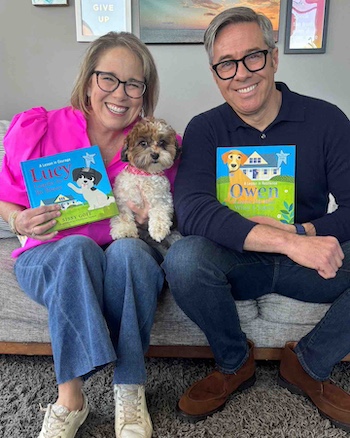The Heart of the Home: Mental Well Being and Lasting Love with David Thomas, Sissy Goff, & Gabe and Rebekah Lyons
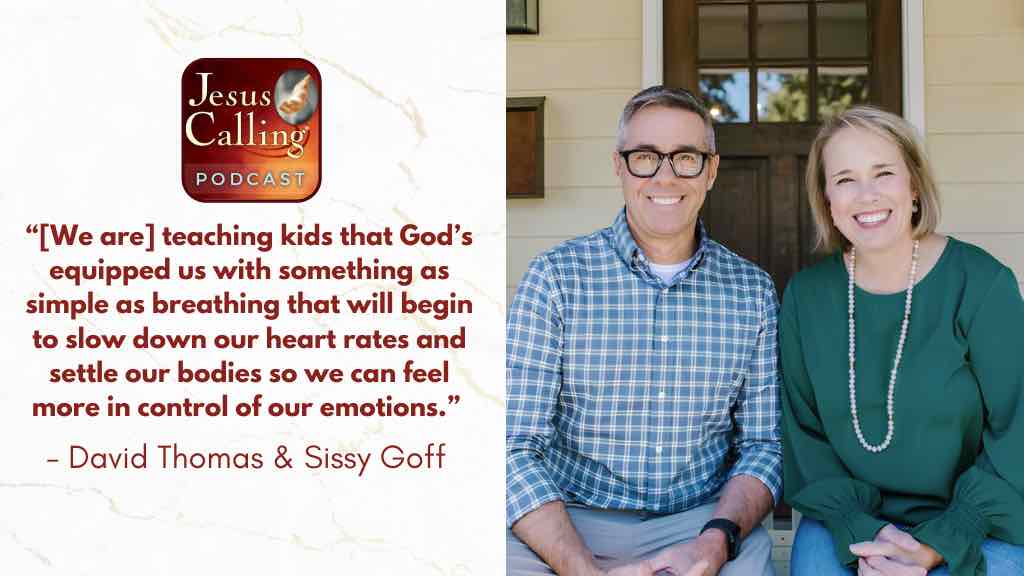
David Thomas: We certainly want to help kids develop in that space of just not pushing those feelings down, but really working through those strong emotions. For example, with something as simple as breathing, I could begin to slow down my heart rate. We love teaching kids about how God made our brains and bodies and that He’s given us these extraordinary abilities to do that settling—but it takes some work.
The Heart of the Home: Mental Well Being and Lasting Love with David Thomas, Sissy Goff, & Gabe and Rebekah Lyons – Episode #472
Narrator: Welcome to the Jesus Calling Podcast. This week, we’re joined by Sissy Goff and David Thomas, longtime counselors and co-executive directors at Daystar Counseling Ministries in Nashville. With over three decades of experience each, Sissy and David have dedicated their lives to walking alongside kids and families as they face anxiety and stress and providing kids with tools for healthy living.
Later in the episode, we’ll hear from authors and speakers Gabe and Rebekah Lyons. Gabe and Rebekah are parents to four children—including two with Down syndrome—and they share about the unexpected challenges that have deepened their family’s bond.
Let’s begin with David Thomas and Sissy Goff.
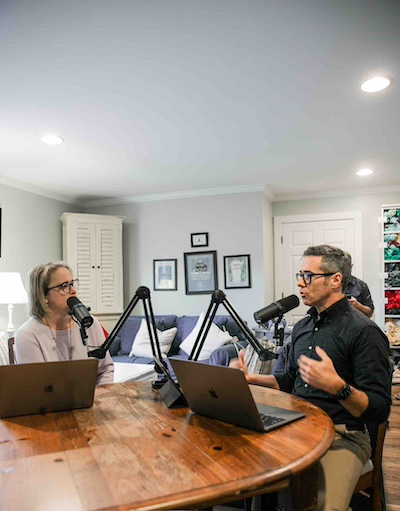
Sissy: My name is Sissy Goff, and I am the co-executive director at Daystar Counseling Ministries with my good friend David Thomas. [We] have been doing this work for thirty years, and out of that, get to write and speak and have our own podcast called Raising Boys and Girls. [We are] just so honored to get to be with you all today.
David: I’m David Thomas, and I am the co-executive director at Daystar and honored to get to work alongside my dear friend. We’re really grateful that we have the opportunity every day to sit with kids and families and take what we’re learning through those conversations into different spaces with teaching and writing and podcasting.
Encouraging Children to Work Through Their Feelings
One suspicion that we both carry is that I think more than any other time in history, we’re doing a pretty extraordinary job of inviting kids to name their feelings, but [we are] concerned that maybe that’s where we’re stopping—that we’re helping them identify what they feel but not really work that through. I think kids who don’t develop the navigating part feel really roadblocked in these big emotions, like, I don’t know what to do with it, I don’t know how to slow it down, I don’t know how to make it stop when it turns toward anger—and maybe that comes out sideways toward a sibling or a parent.
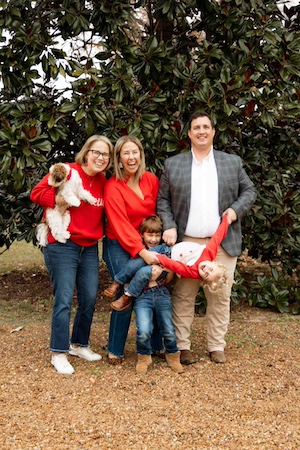
Sissy: Kids are not learning to navigate their emotions. In the absence of healthy, helpful, coping skills, parents become kids’ coping skills that they often don’t desire. A four-year-old doesn’t think, Wow, when I really blow up, it hurts my mom or dad, or, I end up getting in trouble, and I don’t think I really wanna make that choice right now. I just have this big emotion, and the only thing I can think of is to let it out, and it’s gonna come out at you. That is where the coping strategies feel especially important and how to incentivize kids towards those, because again, often they’re not going to use them on their own.
What we see with kids who are anxious—probably every kid David and I have ever met who’s anxious, which now is one in four kids, one in three adolescents, [and] girls are twice as likely as boys—every one of those kids is really bright, really conscientious. They try really hard. They care so much. Those kids sometimes don’t want to say, I felt really angry when… or, I was really disappointed about… They do tend to stuff their feelings because they want to please and they want to get it right. The more they can have a release for emotions in appropriate language, the less those emotions are going to get built up and come out sideways as something different.
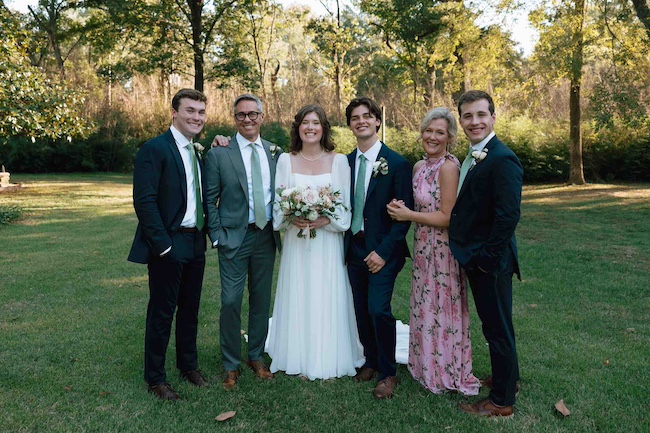
David: We talk a lot about the combination of naming and navigating and how both are equal parts essential to the equation. Our great hope is to really begin to build those tools on the front side of development as early as possible.
Responding Over Reacting
We certainly want to help kids develop an understanding that God has equipped us with these amazing abilities with something. For example, with something as simple as breathing, I could begin to slow down my heart rate. We love teaching kids a tool we call square breathing. When I teach it to boys, I call it combat breathing, which is something I learned in some consulting I did with Navy SEALs and Army Rangers. These are individuals who have to be able to settle themselves and make sure their thinking brain is online so that they can make good and informed decisions when they’re in these heightened emotional states. [We are] teaching kids that God’s equipped us with something as simple as breathing that will begin to slow down my heart rate and settle my body so that I can feel more in control of my emotions than my emotions feel in control of me.
“[We are] teaching kids that God’s equipped us with something as simple as breathing that will begin to slow down my heart rate and settle my body so that I can feel more in control of my emotions than my emotions feel in control of me.” – David Thomas
Sissy: The way that we teach square breathing, we want to put our hand on our leg, because this is where we’re going to employ the senses to. We’re going to draw a really slow square on the leg, and with each line of the square, we’re going to breathe a different way. So on the count of four, we’re going to breathe in and draw the first line—one, two, three, four, pause in the corner. Two, three, four, [draw the] second line—two, three, four, breathing out, pause. Two, three, four, breathe in with the third line, pause. Two, three, four, and then complete the square breathing out.
David: I think there’s something really important about not only educating kids and understanding how our brains and bodies work, but really leaning into that word practice. We’ve got to practice these skills with consistency so that we can get to a place where I can feel more in control of my emotions than they are in control of me.
“I think there’s something really important about not only educating kids and understanding how our brains and bodies work, but really leaning into that word practice. We’ve got to practice these skills with consistency so that we can get to a place where I can feel more in control of my emotions than they are in control of me.” – David Thomas
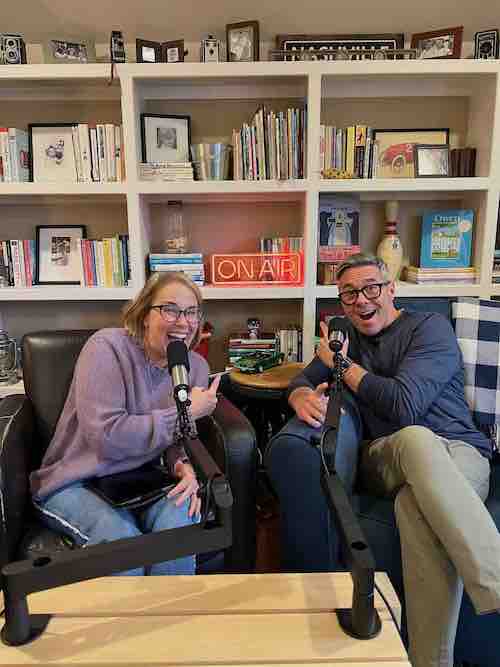
Sissy: And not only do we have to practice, but we have to model it as the grownups in their life too. We talk so much about how we can only take the kids we love as far as we’re going ourselves. If we’re not regulating our own bodies, if we are not able to respond rather than react, then everybody’s going to be really operating out of the amygdala of their brain, which is the fight or flight region of our brain.
“We can only take the kids we love as far as we’re going ourselves. If we’re not regulating our own bodies, if we are not able to respond rather than react, then everybody’s going to be really operating out of the amygdala of their brain, which is the fight or flight region of our brain.” – Sissy Goff
When that part of the brain has taken over, the blood flow is all moving towards the amygdala rather than the prefrontal cortex that helps us think rationally and manage our emotions. So parents will say to us, “My child’s like a crazy person when they get to that place.” Right, because their rational thinking brain isn’t even online at that moment. Breathing is going to dilate the blood vessels of our brain and shift the blood flow right back to the prefrontal cortex.
We love a code word, too, that is just a word you can use as a family that everybody knows this means that if anybody says it, we’re going to take a minute and go to our own space, do our own work of regulating our emotions, navigating our emotions, and then we’re going to come back together and be able to have a healthier conversation.
Helping [children] learn that they can lean into how loved they are and to where God has uniquely gifted them, and step out in that to experience that things that might sound a little scary end up being a whole lot of not only fun, but really rewarding, too.
“Helping [children] learn that they can lean into how loved they are and to where God has uniquely gifted them, and step out in that to experience that things that might sound a little scary end up being a whole lot of not only fun, but really rewarding, too.” – Sissy Goff
Helping Kids Navigate Anxiety
A kid that I met with a couple of years ago blew me away. She was struggling with a little bit of anxiety, and we were talking about grounding techniques—those sensory input things that we can do that help. Anxiety lives in the past and the future, and grounding techniques bring us back into the present.
One of our favorite grounding games is 5-4-3-2-1 where we say, “Tell me five things you see, four things you hear, three things you smell, two things you taste, and one thing you feel.” You can do any order of the senses. This girl and I were talking about grounding games for her when she was laying in bed because she struggled the most with worries at bedtime, and she said, “I’ve started one of my own.” I said, “Tell me about it.” She says, “Well, I lay in my bed and I go through the alphabet. I think about somebody I know whose name starts with each letter of the alphabet, and I pray for them. So A, I think of my friend Abigail, and I pray for her for a few minutes. And then, I switch to B, and I have a friend named Bea at school, and I pray for her. And then, C is my grandmother.” She goes through as much as she can of the alphabet as she’s falling asleep. And I love that not only is she experiencing a sense of purpose and connection and relationship, but she’s also grounding herself by connecting to God in a way that builds her up both spiritually and emotionally.
David: I think that story is a reminder of something really important to the two of us. We have talked often about how in this particular moment in time, we’re seeing this greater space than ever between kids’ faith and their feelings, and we want the two to intersect as often as possible. The story Sissy just shared is a beautiful picture of how that can happen. We can incorporate the breathing we’ve talked about alongside speaking truth to ourselves and breathing in a part of Scripture and breathing out a part Scripture. And so, we’re experiencing the dual benefit of this settling that can happen as we do this deep, slow, breathing while also [being] impacted by the truth of Scripture and how it changes us—how it transforms us.
Sissy: We have been doing this work for thirty years, and we have heard about a lot of different books, a lot of different devotionals over the years. I would say, unequivocally, the book I have heard the most about for kids in all these years is Jesus Calling. It is so sweet to not only hear kids talk about it, but also to feel like it’s a book that I trust for kids of all ages in any season of life. I think it’s one of the most trusted resources out there.
David: I wholeheartedly agree, and I would say as well that I’ve lost count with the number of adolescent boys over the years who’ve talked about reading Jesus Calling to start their day. I think getting adolescent boys to read anything is a great task, and getting them to engage with something as meaningful as these resources, I’m jumping up and down every time I hear a version of that story. And I think what they’re experiencing is what I know to be true in my own life—am I inputting meaningful content that’s sustaining me spiritually, that’s sustaining me mentally? I’m beyond grateful for the Jesus Calling content that I think has offered that to kids, adolescents, and adults for a long time.
Sissy: We’ll be reading a passage from Jesus Listens for Kids, August 10th:
Dear Jesus,
Sometimes I feel like the problems of this world—mine and other people’s—are shouting for my attention. These troubles can start to take up so much room in my thoughts
that get tired and I want to stop trying. When this happens, please remind me that I can choose what I think about. Instead of letting ugliness fill up my mind, I can decide that I’m going to think about You. Then Your Light will shine into every corner of my mind, chasing those dark thoughts away.
David:
Jesus, You cheer me up and cheer me on with Your strong words: “You can have peace in Me. In this world You will have trouble. But be brave! I have defeated the world!”
In Your powerful Name, Jesus,
Amen
Narrator: To learn more about David and Sissy, please visit www.raisingboysandgirls.com, and be sure to check out their new children’s book series, The Daystar Dogs.
Stay tuned to Gabe and Rebekah Lyons’s story after a brief message.
JESUS CALLING: STORIES OF FAITH Returns for Season 4!
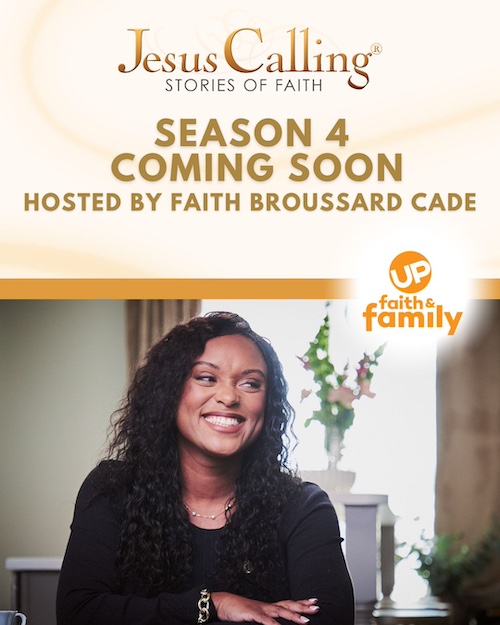
Hey everyone, this is Faith Broussard Cade, your host for the fourth season of Jesus Calling: Stories of Faith on UPTV. We’re so excited to bring you inspiring stories of people from all walks of life, who have turned to their faith in times of struggle, and in times of joy. We’re going to hear from some extraordinary guests this season, including Julie Chen Moonves, who you might know as the host of Big Brother. We’ll also be joined by NFL Hall of Famer Terry Bradshaw and Light Heavyweight Champion boxer Andre Ward, GRAMMY award winning gospel singer BeBe Winans, the world renowned Italian tenor Andrea Bocelli, and actress Taraji P. Henson, in addition to many others. And of course, you’ll get to hear more about me and my story, too. I can’t wait to see you there. Stay tuned for the new season coming soon on UPTV!
Our next guests are authors and speakers Gabe and Rebekah Lyons. With nearly three decades of marriage under their belt, Gabe and Rebekah share what they’ve learned through seasons of joy, hardship, raising a family, and navigating the highs and lows of a committed relationship. From their early friendship in college to the trials that matured them overnight, they reflect on what it means to stay connected, fight for unity, and continue to dream together.
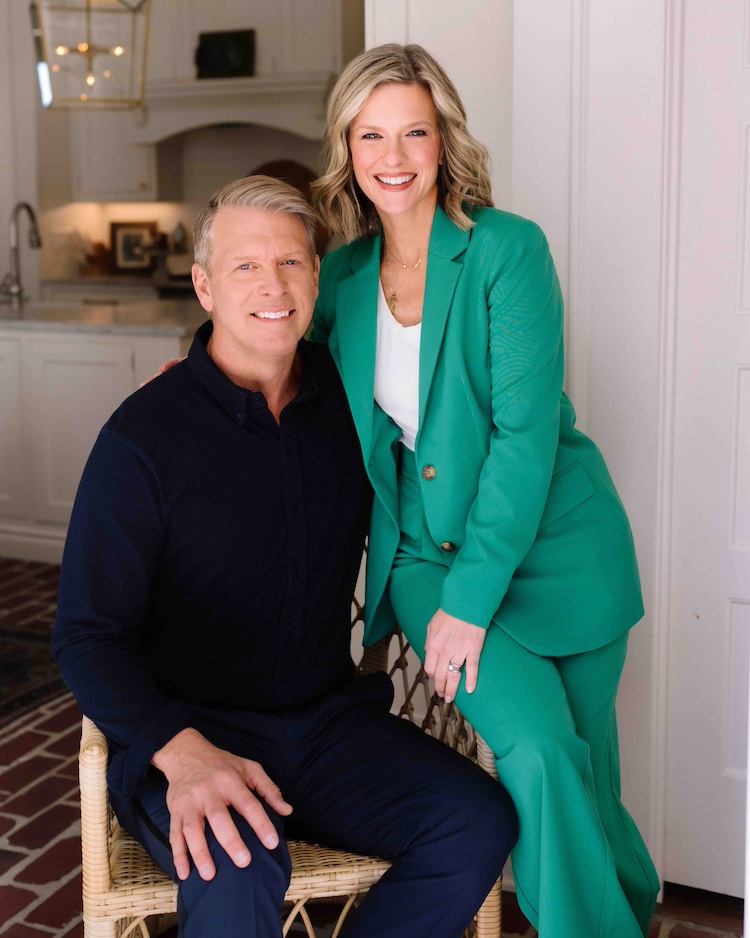
Gabe: I’m Gabe Lyons, and I’m married to Rebekah, we’ve been married twenty-eight years. And I lead an organization called THINQ Media. Our goal is to help Christians understand how to navigate culture by addressing a lot of the cultural issues and current issue topics that many times are complicated and not always talked about within the church environment.
Rebekah: I’m Rebekah Lyons. We have four children ranging from age twenty-four down to twelve. Our oldest and our youngest that we adopted have a Down syndrome diagnosis so that has catalyzed a lot of the work that we do that we are passionate about, as well as my work with writing and teaching on mental health and faith.
Gabe: Rebekah and I first met in college. It was freshman year. One of our friends was throwing a fun hangout one night, and we just met each other and began talking and became fast friends. We didn’t start dating until three years later, but that first night we still remember just the connection, the humor, the fun, the laughing, staying up late into the night telling stories and getting to know each other. That really has become the foundation for our relationship that’s based on friendship and based on a shared vision and enthusiasm and a chemistry.
Rebekah: Definitely fast friends, and we laughed a lot. I think that’s important in a relationship, just having shared visions of what it looks like to run after God and also have a lot of fun.
Raising a Child with Down Syndrome
Rebekah: Three years in, we had one of the hardest things in our marriage. I was twenty-six, Gabe was twenty-five, so it felt like we were kids having kids. We thought we’d wait five years, [but] it turned out to be three when he was born. Six hours after he was born, the doctor came in and said, “We see signs of Down syndrome in your baby.” The other part of that was that he actually was really small full term—four and a half pounds. Failure to thrive. It was an emergency C-section, and he went straight to the NICU.
I think when you come into marriage, you have all these ideas of how you’re going to dream and play and laugh. But life got hard and took a turn really fast, and I think when that trial comes in, you mature overnight. It felt like we almost aged a decade in a twenty-four hour period because all of a sudden we felt so ill equipped. We felt scared. Everything was unknown. We had a choice at that moment—Are we going to lean on each other and will this make us stronger or will this make us drift and suffer in silence alone?
“We had a choice at that moment—Are we going to lean on each other and will this make us stronger or will this make us drift and suffer in silence alone?” – Rebekah Lyons
Gabe: I think this would apply to a lot of couples where there’s a stressful, traumatic moment that can create lots of division, and a lot of individuals just start looking out for themselves. We were gracious that God helped bond us through a crisis that we weren’t expecting. That’s given us a bond and a trust and a lesson to keep going back to His faithfulness, as well as what it means to turn towards one another.
“We were gracious that God helped bond us through a crisis that we weren’t expecting. That’s given us a bond and a trust and a lesson to keep going back to His faithfulness, as well as what it means to turn towards one another.” – Gabe Lyons
Rebekah: Thirteen years later, someone sent us a photo of a little girl on the other side of the world in an orphanage in China. Because we had felt comfortable being a parent of a child with special needs, we felt equipped for it, and it wasn’t so scary and daunting. We were able to bring her home about eight years ago, and it was wild to have a child and then to choose a child. God has given us the grace to do both, and they have taught us a lot about the heart of God.
Remembering What Matters Most When We Disagree
Rebekah: Every season of life is an invitation for conflict and stress because it’s new. We’re all rookies throughout the entirety of our marriage. We’re now launching kids to college or talking to kids who want to get married. We don’t know what we’re doing until we get there, and we both have to look at each other and be like, “Are we gonna be united in how we try to address this new stressor in our life?”
“Every season of life is an invitation for conflict and stress because it’s new. We’re all rookies throughout the entirety of our marriage.” – Rebekah Lyons
This popular phrase in psychology is that everything hysterical is historical. And so why am I so triggered by this conversation about how to load the dishwasher, or how much you spent at the grocery store or whatever? There’s an origin story attached to this, so by recognizing that, we don’t need to correct each other or act like our way is superior because some of these things just are not essential issues to fight about. Let’s get below the surface and make sure we let things go that are not necessary.
One thing that we did to shift things… I realized we were nursing some hurts from past conversations, and so one thing we put in practice that if I felt that Gabe said something that felt harsh or felt demeaning or dismissive, instead of retreating and feeling hurt, I’ll just say, “I’m not saying this was your intention, but when this happened, I felt sad or I felt dismissed.” That gives us an opportunity to keep the conversation going versus me assuming the worst and just feeling completely rejected.
Often, he’ll be like, “Oh, I didn’t mean to do that. That wasn’t my intention. I can see how that might have sounded that way.” And then all of a sudden, we diffused something quickly before it became a big thing.
Taking Proactive Steps to Build a Life Together
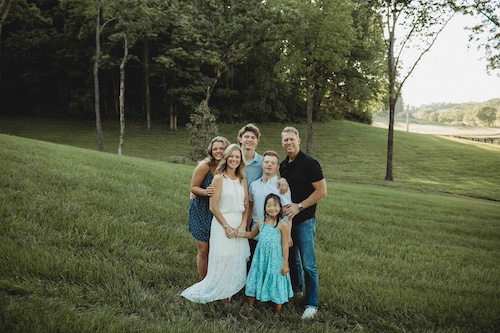
Gabe: Sometimes in a marriage relationship you dream early on, but man, as life piles up, we’ve had to really implement a structure of our rhythms that allow us to keep having conversations about the future. That can be as simple as long walks together where we just get out of the house—there’s no digital devices—and we’re just with one another. And we made sure that there was a moment for our hearts to stay connected, for us to physically be connected, for us to experience just what it was like when we were dating, what drew us to one another in the beginning. It’s usually in those types of moments that we create that we start to dream again. We start to have a moment to just take inventory, to assess what’s right in our marriage? Let’s celebrate that. What’s wrong? Let’s stop doing those things. What’s confusing? Let’s try to reorient and get some perspective on that. And then, what’s missing? What are things we need to add back into our marriage? When Rebekah and I every year take the time to do that, it helps us be proactive to dream about where we want to go in the future and make sure we’re not just reacting every year to the new demands and challenges, but that we’re taking proactive steps together to try to build the kind of marriage and family priorities that we want live in.
“Sometimes in a marriage relationship you dream early on, but man, as life piles up, we’ve had to really implement a structure of our rhythms that allow us to keep having conversations about the future.” – Gabe Lyons
These longings we have, this desire to be known, this pursuit of intimacy was all part of His design for a fulfilling, meaningful, marriage. But so many things can happen—whether it’s in our past, traumatic events, our origin story, the way we were raised, what was modeled for us can really confuse us about how to feel that connection ever again. And in our journey, we’ve realized God’s given each of us one another as part of really the healing agent to help us experience the fullness of feeling, of feeling alive, of being connected and intimate. When we start to recover those feelings, I believe we start to make leaps forward in our marriage, and we move from just kind of status quo and coexistence to thriving.
“We’ve realized God’s given each of us one another as part of really the healing agent to help us experience the fullness of feeling, of feeling alive, of being connected and intimate.” – Gabe Lyons
Devotionals have been an important part of our marriage. It certainly gives us all perspective and a moment to reflect, sometimes through the eyes of an author or someone else who’s had an experience with God that maybe we’ve not experienced yet, and they invite us into that. We find that always encouraging and it builds up our faith to always see how other people are experiencing God and inviting us towards that.
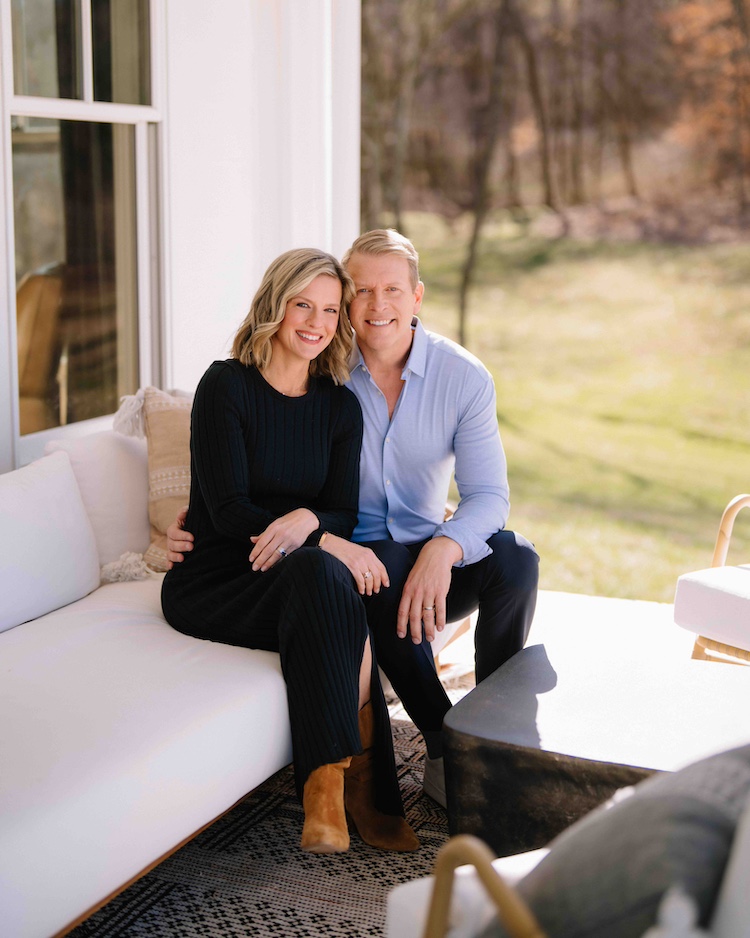
Rebekah: Jesus Calling has been a big proponent for that and has helped people find language for things as they’re processing, as they are learning, and how to have those conversations together as a couple.
Gabe: We can’t imagine a better way to experience marriage and Jesus than through this relationship that He’s designed. And I know in the moments I might be feeling distant from Jesus, that through Rebekah, I’ve been drawn back towards Him and towards commitment to Him. Marriage is a beautiful gift for that reason and so many more.
Rebekah: We’re so grateful for the example of Jesus who modeled humility, who humbled Himself, that He took death on a cross so we could be free, we could have life. We believe that’s a picture of what our marriage should look like—humbling ourselves, walking in the freedom that Jesus paid for so that we could have that. And in that way, we become one and flourish as a married couple.
“We’re so grateful for the example of Jesus who modeled humility, who humbled Himself, that He took death on a cross so we could be free, we could have life. We believe that’s a picture of what our marriage should look like—humbling ourselves, walking in the freedom that Jesus paid for so that we could have that.” – Rebekah Lyons
This reading is from Jesus Listens, December 5th:
Cherished Jesus,
You are the Joy that no one can take away from me. As I rest in Your Presence, I savor the wonders of this glorious gift. I rejoice that this blessing is mine forever—You are mine for all eternity!
I realize that whenever I’m feeling joyless, the problem is not in the source of Joy (You) but in the receiver (me). Sometimes I get so focused on other things—difficulties and distractions in my life—that I neglect my relationship with You. Help me remember to put You first in my life, relating to You continually as my First Love. And please increase my moment-by-moment receptivity to Your Presence. As I spend time delighting myself in You, I receive Joy in full measure!
In Your joyous Name,
Amen
Narrator: To learn more about Gabe and Rebekah Lyons, be sure to check out their new book, The Fight for Us: Overcome What Divides to Build a Marriage That Thrives, at your favorite retailer.
If you’d like to hear more stories about building strong family connections, check out our Peace in Uncertain Times interview with Ellie Holcomb on the Jesus Calling YouTube channel.
Next week: Patricia Heaton
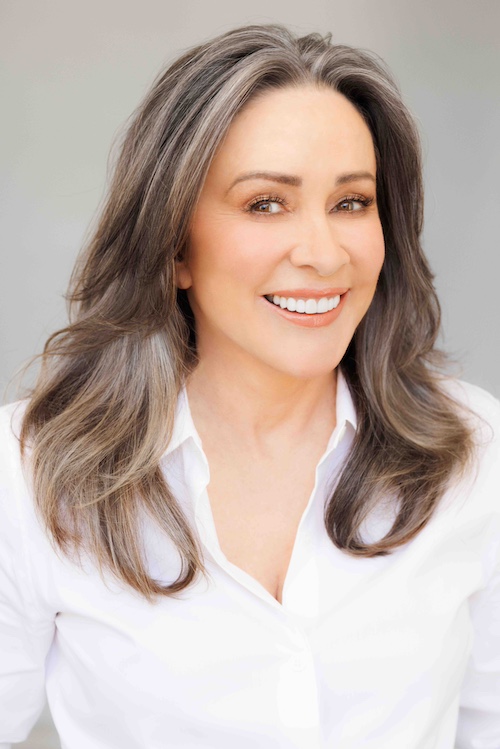
Next time on the Jesus Calling Podcast, we’ll hear from actress and producer Patricia Heaton, known for her roles on beloved shows like Everybody Loves Raymond and The Middle. Patricia opens up about how she’s turned to God when everything seems to be going wrong, both in her personal life and her acting career.
Patricia Heaton: I’ve always had to let God be God because things fall apart so easily. We just have to believe that He has a plan and that He will open doors and shut doors—and that’s what’s best for us.
